The JW Marriott Bengaluru Prestige Golfshire Resort & Spa recently hosted the 19th edition of the Hotel Investment Conference-South Asia HICSA 2024. This landmark event brought together industry leaders, investors, and innovators to discuss the future of hospitality in Bengaluru.
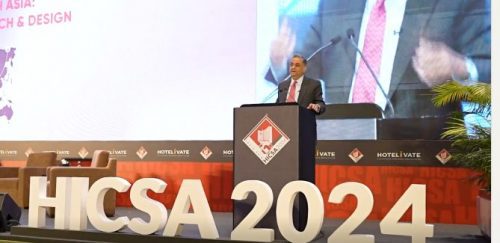
Since its inaugural event in 2005, the Hotel Investment Conference-South Asia (HICSA 2024) has established itself as an unparalleled platform for the global hospitality industry. Renowned for its content-rich sessions and exceptional networking opportunities, HICSA has consistently attracted top brands, hotel owners, financiers, developers, and professional advisors from across the globe.
The highly insightful HICSA 2024 event witnessed over 700 industry delegates converging for a remarkable networking and learning experience.
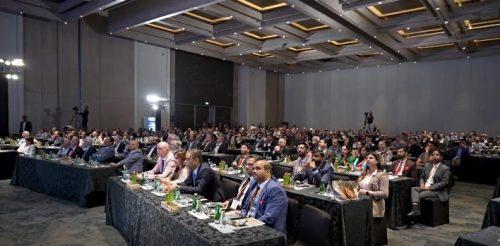
Opening Day at HICSA 2024
The conference kicked off with an engaging presentation by Manav Thadani, highlighting the untapped potential of Food and Beverage (FnB) services in revolutionizing hotel revenue models. This was followed by an enlightening analysis by Jasper Palmaers on the economic dynamics of India compared to the Asia-Pacific (APAC) region. Palmaers pointed out the optimistic GDP forecasts for India in the 2024-2025 period, signalling a fertile ground for increased investment.
Further discussions at the HICSA 2024 focused on the strategic approach of choosing the ‘Asset Right’ over merely ‘Asset Light’ investments. Esteemed speakers shared their expertise on securing the most advantageous deals, underlining the importance of wise investment in the hospitality sector.
Ushering in a series of insightful sessions, engaging discussions, and good networking opportunities, the first day of HICSA 2024 was marked by memorable moments and valuable learnings, setting a high bar for the rest of the conference.
Liz Ortiguera’s Insights on Global Sustainability in Travel and Tourism
Liz Ortiguera, the Managing Director for Asia-Pacific and Senior Advisor to the CEO at the World Travel & Tourism Council, delivered an enlightening presentation on Global Sustainability and its implications for the travel and tourism industry. Her insights shed light on the evolving dynamics of sustainability within the sector, highlighting significant shifts, consumer trends, and industry initiatives aimed at fostering sustainable practices.
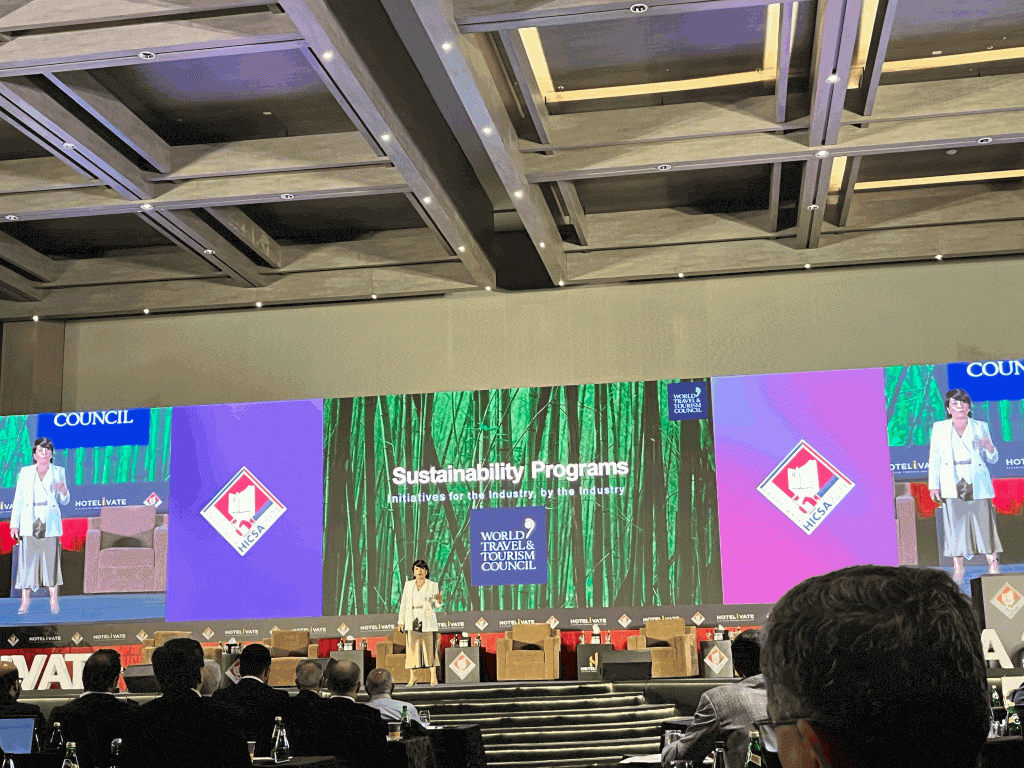
Ortiguera pointed out a notable transition from traditional destination marketing towards destination management, with sustainability emerging as a key component of this shift. This change reflects an industry-wide acknowledgement of the need to balance visitor numbers with the preservation of natural and cultural assets.
Highlighting consumer behaviour in the Asia-Pacific region, Ortiguera shared compelling statistics indicating a strong preference for sustainable travel options among consumers, particularly in India where a staggering 97% of affluent travellers view sustainable travel as essential. This stark figure underscores the growing consciousness among consumers about their travel choices’ environmental and social impacts.
Despite these promising trends, Ortiguera raised concerns about social sustainability in the Indian travel and tourism workforce, where only 11% are women. This figure starkly contrasts with the Asia-Pacific average of 38%, suggesting significant room for improvement in gender diversity within the industry in India.
Further advancing the conversation on sustainability, Ortiguera introduced the World Travel & Tourism Council’s Hotel Sustainability Basics Program. This initiative represents a significant step towards mainstreaming sustainable practices in the hospitality sector by providing hotels with clear, actionable guidelines to achieve an entry-level sustainability certification. The program aims to encourage hotels worldwide to adopt fundamental sustainability measures that contribute to the broader goals of environmental conservation and social responsibility.
Ortiguera’s presentation at HICSA 2024 not only highlighted the critical importance of sustainability in shaping the future of travel and tourism but also underscored the sector’s potential to lead by example in the global sustainability movement. Through initiatives like the Hotel Sustainability Basics Program and the adoption of sustainable practices by brands and consumers alike, the travel and tourism industry is poised to make significant strides towards a more sustainable future.
Owned & Managed Assets
An interesting session moderated by Vineet Verma MRICS, Director – Brigade Hospitality, Brigade Group brought together some power-packed thoughts on Owned & Managed Assets—derived from the experiences of our panellists Dillip Rajakarier, Group CEO, Minor International, Patu Keswani, Chairman & MD, Lemon Tree Hotels and Priya Paul, Chairperson Apeejay Surrendra Park Hotels.
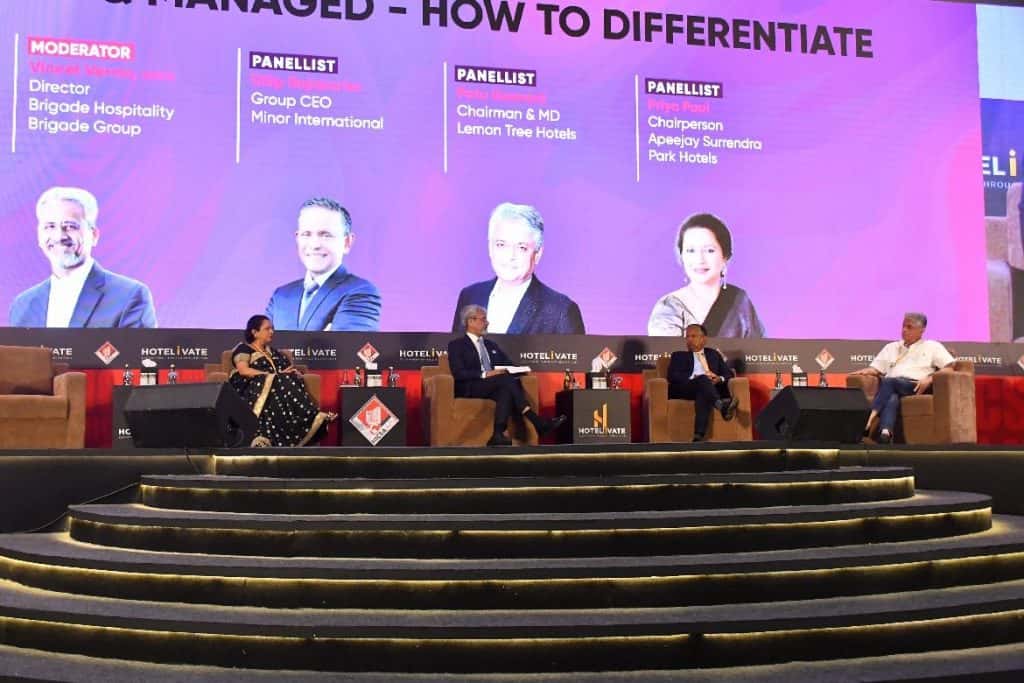
The session provided key takeaways regarding the hotel industry’s financial and operational outlook. It was noted that hotels are considered appreciating assets, yet the focus on asset returns and owners’ Return on Capital Employed (ROCE) often gets overshadowed by an emphasis on EBITDA.
The future is expected to witness growth in hotel rooms, particularly in Tier II and Tier III cities, with an asset-light strategy being identified as the preferred path forward. This strategic approach allows for scalability and flexibility, accommodating the industry’s expansion needs without the burden of heavy capital investment.
A significant point of discussion revolved around the necessity for operators to embrace an “Owner mindset.” This shift in perspective is essential for ensuring that the interests of both operators and owners are aligned, fostering a collaborative environment that benefits both parties.
Moreover, the potential for creating 25 million jobs in the next five years was highlighted, addressing the industry’s capacity for significant employment generation. However, the current challenge of a talent crunch in the hospitality sector was acknowledged. Solutions such as digitalization and an enhanced focus on training and development were suggested as effective strategies to mitigate this issue, ensuring that the workforce is equipped with the necessary skills and knowledge to meet the industry’s demands.
Manav Thadani MRICS, Founder Chairman of Hotelivate with Federico J. González, Executive Vice Chairman, Radisson Hotel Group and CEO, Louvre Hotels Group
Manav Thadani MRICS, Founder Chairman of Hotelivate, engaged in a revealing conversation with the dynamic Federico J. González, Executive Vice Chairman of the Radisson Hotel Group and CEO of the Louvre Hotels Group. Their discussion, themed “Driving Change (Successfully) in an Ever-Evolving Landscape,” offered profound insights into the mechanisms and philosophies underpinning successful organizational change within the hospitality sector.
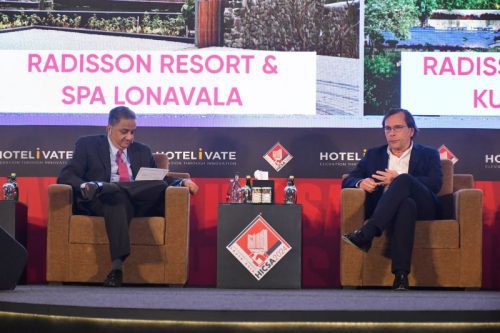
Throughout the dialogue, several key points emerged. Initially, it was emphasized that initiating change must begin internally within a company. Establishing a culture steeped in analysis, change, and adaptation, aligned with the company’s vision, is crucial for sustainable growth. Radisson’s aspiration to be ranked among the top three hotel companies globally was highlighted, with a unique metric for success: not the quantity of hotel rooms, but rather how the public perceives the brand.
A significant piece of advice shared during the conversation was the importance of self-reflection, suggesting individuals ask themselves daily what unique contributions they have made. This introspection is seen as a marker of positive impact and right action within the organization.
Focusing on strategic growth, Radisson’s commitment to expanding its presence in India was discussed as a key component of its future growth strategy. With an optimistic outlook towards 2025, Radisson was noted as the most searched-for hotel brand in India, signifying its strong foothold and public interest within the market. Beyond India, attention was drawn to the EMEA region, with Saudi Arabia identified as a particularly vibrant area for hotel development.
The discussion also touched upon technological advancements, highlighting ‘The Pulse,’ a Radisson innovation aimed at enhancing revenue and profit management through holistic approaches. Furthermore, in the realm of Food & Beverage (F&B), it was suggested that re-engineering hospitality concepts through strategic partnerships with local entities could significantly enhance F&B profitability within hotels, illustrating a forward-thinking approach to hospitality management and development.
Federico J. González also shared Radisson’s long-term vision and recent technology-driven initiatives that have impacted the South Asian hospitality industry.
Real Estate – The Art Of Investing in the Right Deals
An insightful session, chaired by Amit N., Vice President & Executive Board Member of the Hospitality Asset Managers Association MEA (HAMA MEA), facilitated a comprehensive discussion on “Real Estate – The Art Of Investing in the Right Deals.” This session brought together a panel of distinguished experts, including Arshdeep Sethi, MRICS, President of Real Estate at RMZ; Indranil Ghosh, Managing Director & Head of Pan-Asia Special Situations at Cerberus Capital Management (Singapore); and Suma Venkatesh, Executive Vice President of Real Estate And Development at The Indian Hotels Company Limited (IHCL).
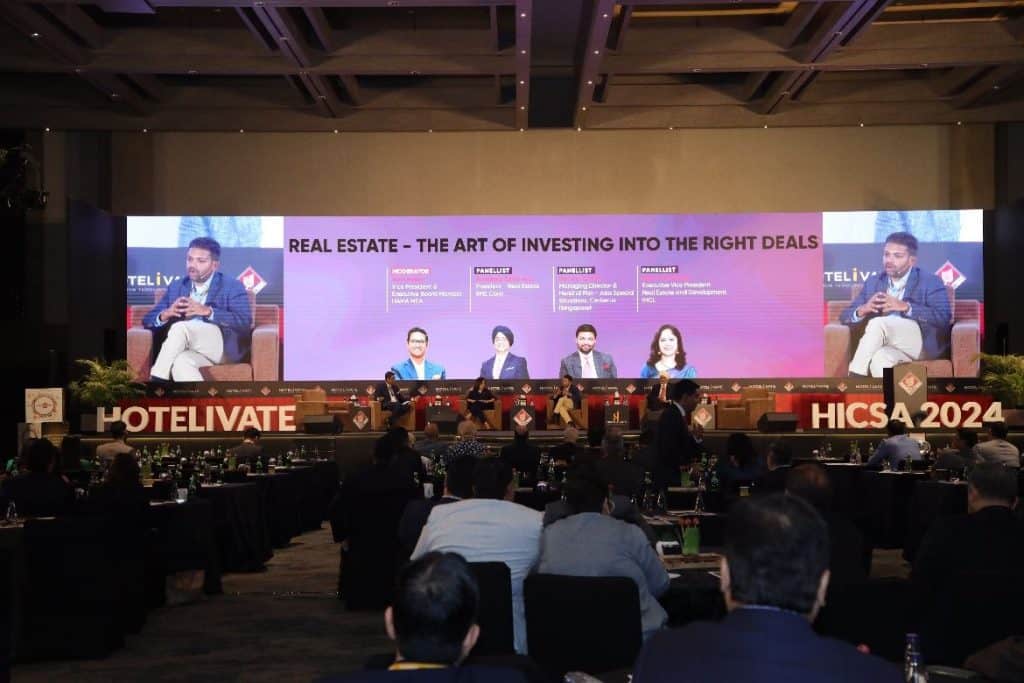
The dialogue opened up various perspectives on strategic investment in the real estate sector, particularly within the hospitality industry. One of the central themes was the preference for an “Asset Right over Asset Light Strategy,” highlighting a trend where owner/operators show a willingness to adapt their operating structure based on the asset, market conditions, and anticipated financial returns.
The discussion also touched on the growing interest in mixed-use developments. These are gaining popularity as a way to mitigate the inherent volatility of hotel investments. By creating an ecosystem that adds economic value to all its components, mixed-use developments offer a balanced approach to real estate investment.
Furthermore, the panellists noted that acquisitions typically promise higher returns compared to the cost of new developments, given that the acquisition cost is often lower than the replacement cost. This point underscored the strategic advantage of acquiring existing properties over building anew in certain contexts.
Lastly, it was emphasized that financial assessment metrics for investments cannot be one-size-fits-all. Instead, these metrics need to be carefully adjusted to suit the specific characteristics of each asset, the market it operates in, and the unique circumstances of the investment opportunity. This tailored approach is essential for accurately evaluating the potential of real estate investments in the hospitality sector.
Navigating Franchising and Third-Party Dynamics
One of the highlights was the engaging panel discussion on Navigating Franchising and Third-Party Dynamics which saw participation by industry stalwarts, Atul Jain, Nandivardhan Jain, Amith Khanna, Gautam Birudavolu, Vikram Cotah, and Vikram Singh Chauhan. The focus was on the intricacies of creating productive collaborations.
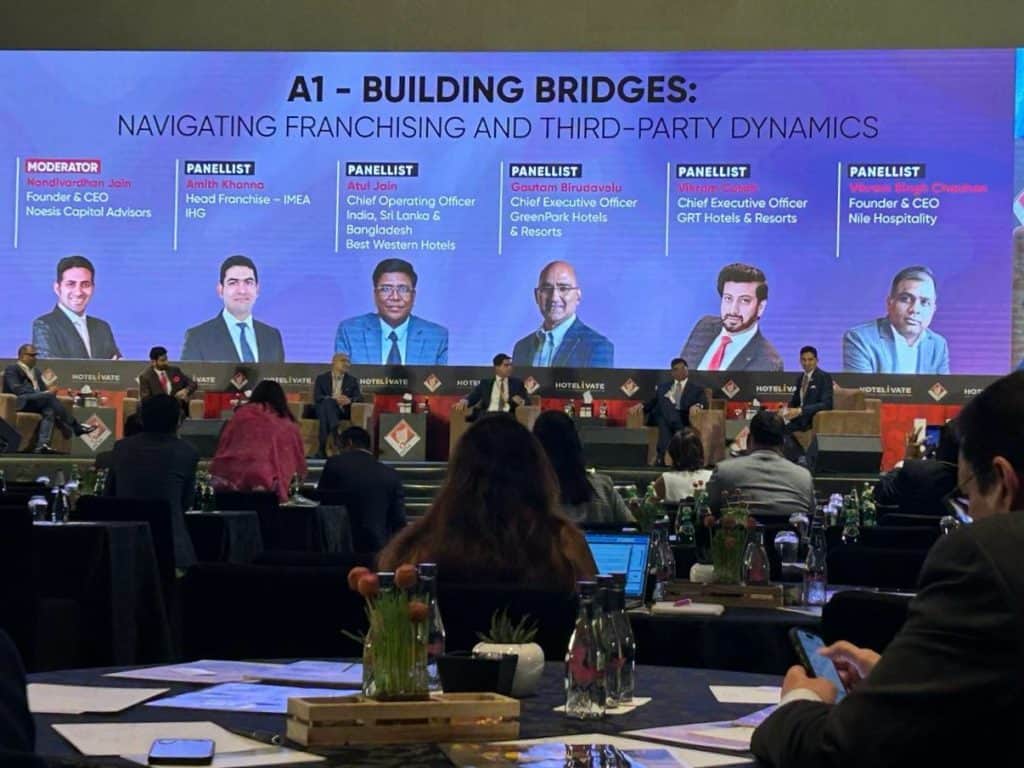
The session delved deep into the challenges and opportunities awaiting professionals in the Indian hospitality landscape, exploring strategies to unlock its immense potential. It served as an excellent platform for knowledge sharing and acted as a catalyst for fostering meaningful collaborations and innovative solutions.
“Here’s to a future where the Indian hospitality industry thrives through collaboration, innovation, and shared insights!” said Atul Jain, Chief Operating Officer -BWH India (BWH India Sri Lanka and Bangladesh).
Vikram Cotah, Chief Executive Officer at GRT Hotels & Resorts, contributed with interesting inputs to the discussion on owners, hotel brands, and the emerging role of a third stakeholder – the third-party operator – in shaping the future of Indian hospitality. He noted that as brands begin to aggregate the unorganized or standalone hotels across the country in the next decade, there was a consensus at HICSA 2024 that the coming decade will be the “India story.” During this period, hospitality and travel are expected to experience an unprecedented golden era as the country progresses towards becoming the 3rd largest economy in the world.
Vikarm Cotah said: “GRT Hotels is a pioneer in the franchise world with the 2nd oldest Radisson in India franchised and operated by GRT Hotels since 2001 and 3 more in Mahabalipuram.”
How Asia Pacific Travels
At the HICSA 2024 event, Santosh Kumar, Country Manager for India, Sri Lanka, Maldives, and Indonesia at Booking.com, delivered an enlightening speaker session titled “How Asia Pacific Travels,” bringing a plethora of observations and insights to the audience.
He highlighted that the primary motivations for travel within the Asia Pacific region are experiences, food, and relaxation. Notably, there has been a shift in travel habits among Indians, who are now opting for multiple shorter trips throughout the year instead of a single, prolonged vacation as was common before the pandemic. Furthermore, food and beverage options are becoming a critical factor for Indian consumers when selecting accommodations.
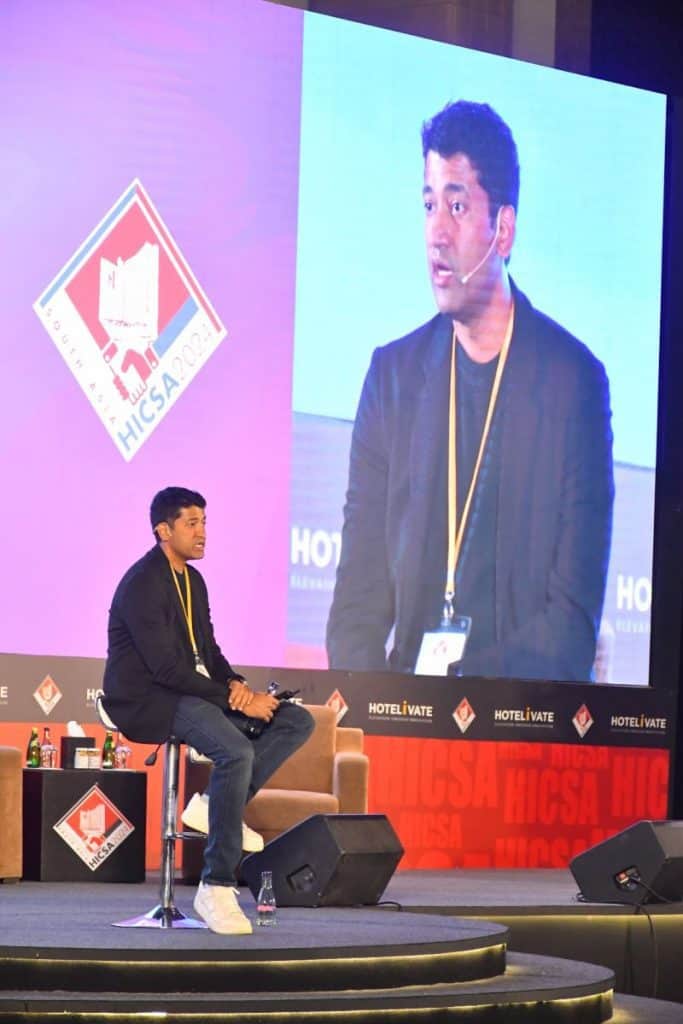
Kumar also pointed out the significant growth in interest for Tier II cities, which have emerged as some of the most searched-for destinations, including Lonavala, Puducherry, and Ooty. This marks a noticeable shift in travel preferences towards exploring less conventional destinations within India.
Additionally, there has been a substantial increase in interest in alternative accommodations, which accounted for 33% of all bookings in 2023. This trend is supported by the rise of micro-entrepreneurs in the country, indicating a continued growth trajectory for alternative lodging options in the future.
Blending Technology With Aviation & Hospitality
Maryam Farooqui, Senior Correspondent, moneycontrol.com interviewed industry experts Anshul Gupta, Managing Director, Accenture and Mani Ganeshan, Senior Vice President – Travel Distribution Engineering and Centre Head – Technology Centers, India, Amadeus on Blending Technology With Aviation & Hospitality.
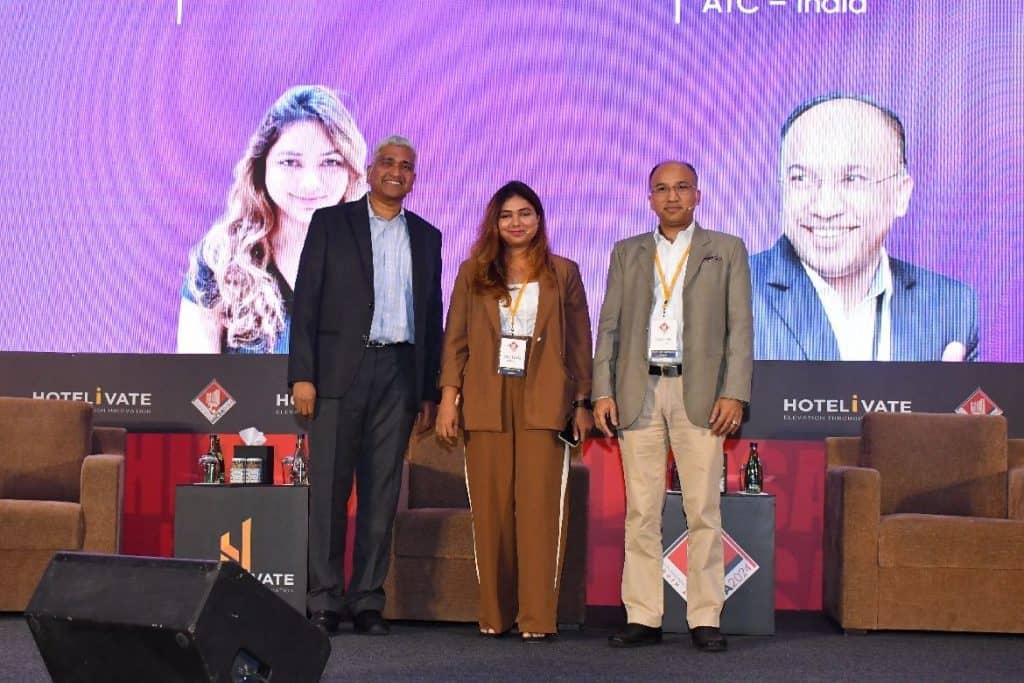
The discussion underscored the importance of transparent technology in enhancing travel experiences, highlighting the need for technology that integrates smoothly and reduces friction without being intrusive, thereby facilitating better interactions between guests and staff.
A significant connection was drawn between digitization and sustainability, with discussions on how digital initiatives in hotels, such as AI-powered creation of fuel-efficient flight paths, are advancing sustainability efforts. The discussion acknowledged India’s rapid and aggressive adoption of technology, though it also pointed out the challenges faced due to the insufficient technology infrastructure in Tier II and Tier III cities.
The interaction concluded with insights into the future direction of hospitality and aviation technology. The goal is to develop traveller-facing technology that minimizes friction throughout the customer journey while maintaining a human touch, thereby revolutionizing the way services are delivered in these industries.
Flying High with Pieter Elbers, the Chief Executive Officer of IndiGo
Pieter Elbers, the Chief Executive Officer of IndiGo (InterGlobe Aviation Ltd), delivered an engaging address to delegates, discussing the theme “Flying High” and sharing insights into IndiGo’s rapid growth both within India and internationally.
In his speech, Elbers highlighted several key points regarding the aviation sector’s growth and IndiGo’s role in this expansion. He noted that India’s GDP is projected to grow by 8%, with the Indian aviation sector expected to witness an unprecedented growth rate of over 100%. Despite India’s large and affluent young population showing a willingness to fly, the aviation market remains significantly underpenetrated, with only 0.5 aircraft per million of the population.
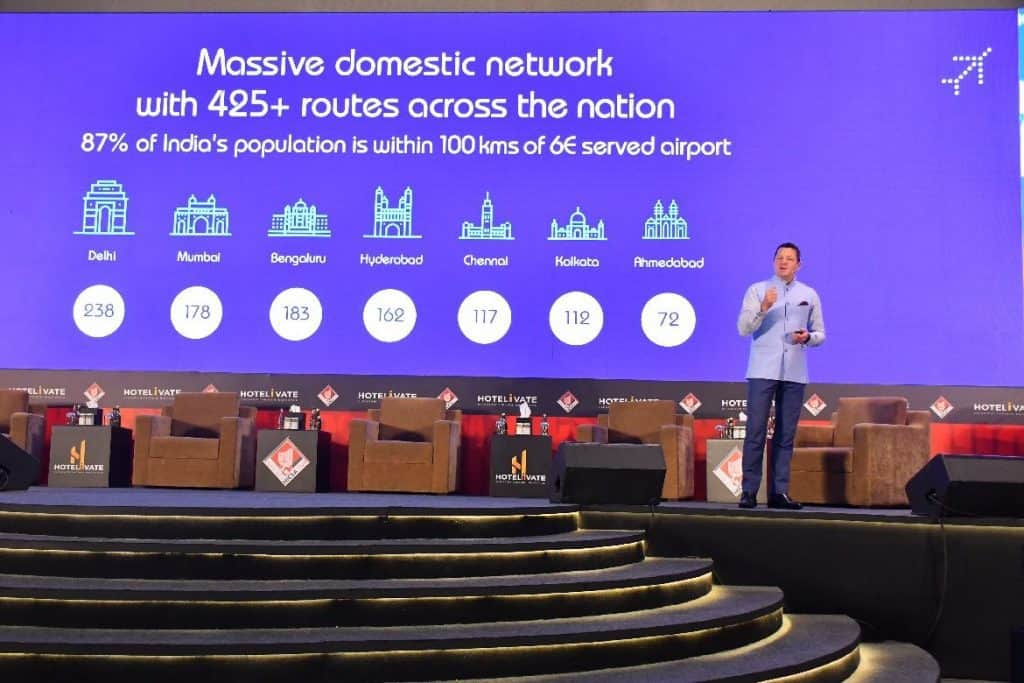
Elbers pointed out the strong potential for India to become a major aviation hub, a vision now being supported by the government’s ambitious plans for aviation infrastructure development. He proudly mentioned that IndiGo achieved the milestone of serving 100 million customers annually in just 17 years, a feat that took longer for many international airlines to accomplish, showcasing IndiGo’s rapid rise in the industry.
Furthermore, Elbers identified Delhi, Mumbai, Bengaluru, Hyderabad, and Chennai as the biggest aviation hubs in India, emphasizing their importance in the country’s aviation network. He concluded by advocating for strategic partnerships with international airlines as a crucial step forward for IndiGo, aiming to enhance connectivity and further bolster its growth trajectory in the global aviation market.
Live Limitless: Going All The Way
Sébastien Bazin, Group Chairman & CEO, Accor took centre stage and urged the audience to Live Limitless: Going All The Way. In his address, he pointed out that the demand for hospitality services in India has consistently surpassed supply over the past decade.
This period, he said, witnessed a global surge in the emerging middle class by 1 billion people, with India contributing to 25% of this increase. Looking forward, an additional 1.3 billion individuals are projected to join the middle class in the next 20 years, with India expected to account for a third of this expansion. This demographic shift underscores a critical need for an increased supply of hospitality services in India.
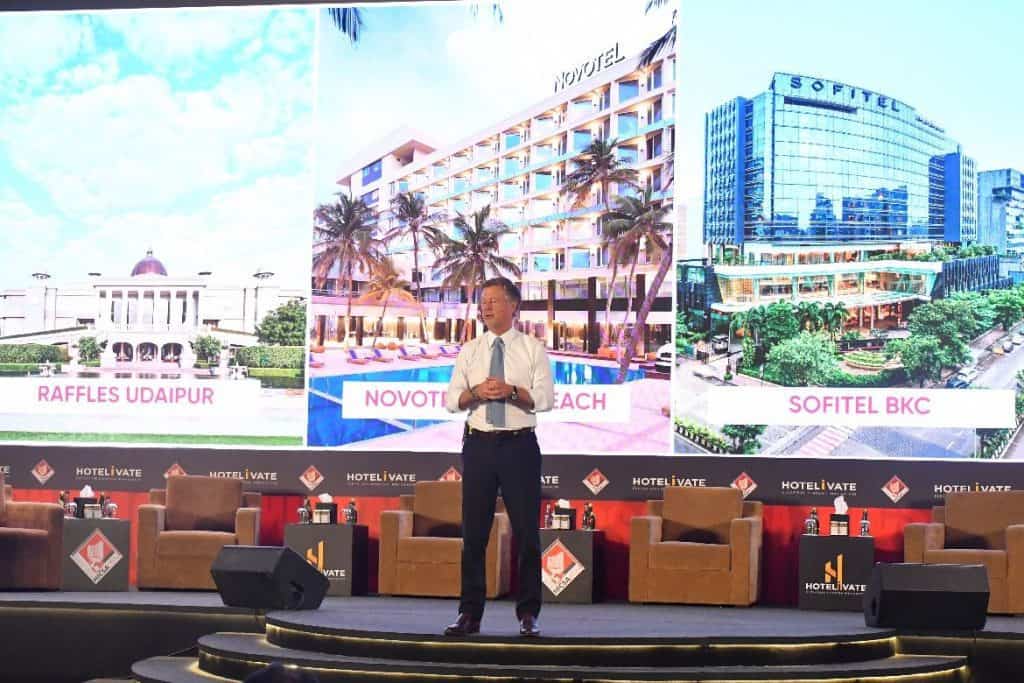
The notion that “Hospitality is Predictable” was underscored by the observation that India is currently experiencing a growth upswing similar to those previously seen in the USA, Europe, and China. This pattern of growth is anticipated to recur in the coming decades across various regions, indicating a cycle of consistent expansion in the hospitality sector.
Over the last decade, Accor has notably shifted its focus from the midscale segment to the luxury segment, transitioning from a Europe-centric perspective to a global outlook. This strategic realignment reflects the changing dynamics and opportunities within the global hospitality market.
The importance of local partnerships for hotel companies looking to enter the Indian market was emphasized. A collaborative approach with the aviation and travel infrastructure development in India was identified as the most viable path forward, highlighting the integral relationship between hospitality services and broader infrastructure development.
Sustainability was recognized as a significant challenge in the Indian market, attributed to the proportional scarcity of resources. Accor’s commitment to sustainability was highlighted through its efforts in environmental and social sustainability initiatives, including the employment of 120,000 people in the last year, illustrating the company’s comprehensive approach to addressing sustainability challenges within the hospitality sector.
Where’s the Growth Opportunity?
Achin Khanna, MRICS, Managing Partner – Strategic Advisory at Hotelivate, moderated an interesting panel discussion on “Where’s the Growth Opportunity?” featuring a remarkable lineup of industry experts.
The panel included D. Shawn Hill, Chief Development Officer APEC, Marriott International; Christopher Wong, Senior VP Development – APAC, Four Seasons Hotels and Resorts; Clarence Tan, Senior VP Development – Asia Pacific, Hilton; Elie Younes, Executive VP & Global Chief Development Officer, Radisson Hotel Group; and Serena Lim, Chief Growth Officer, The Ascott Limited. They delved into the topic of “Where’s The Growth Opportunity” and shared their aspirations for the upcoming year, providing valuable insights and perspectives on the future of the hospitality industry.
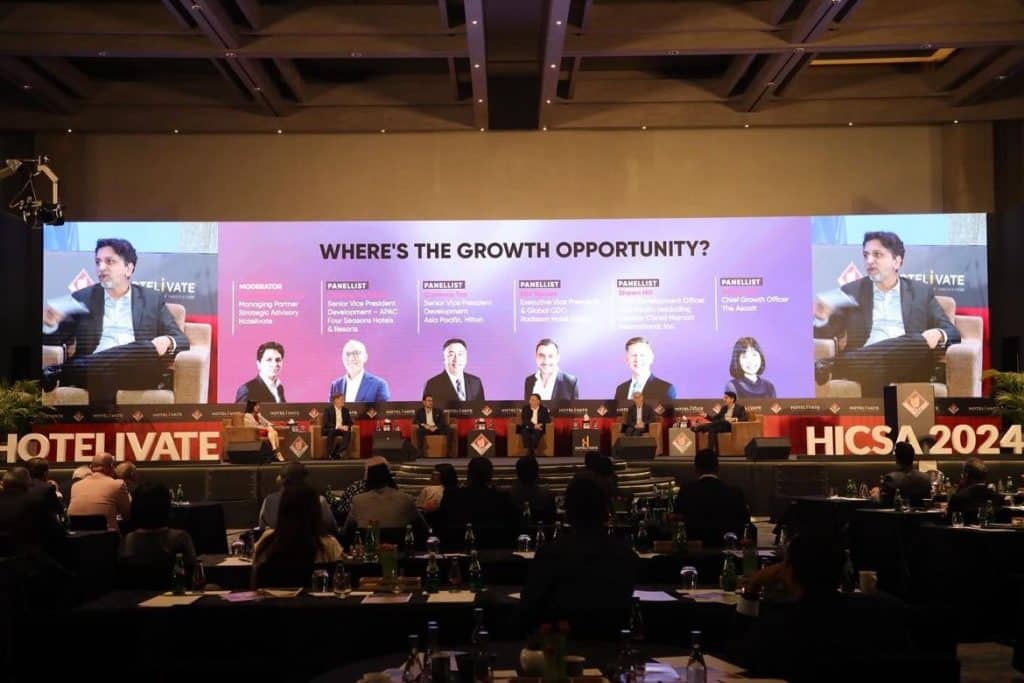
India remained at the forefront of growth opportunities within the APAC region for all five brands present on the panel, each maintaining a robust project pipeline in the area for the following year. There was notable optimism around soft brands, including the Curio Collection, Autograph Collection, and Radisson Collection. The market share for extended stay and serviced apartment offerings saw an increase, driven by the rising interest in lifestyle and experience-focused travel.
Although the ‘All Inclusive’ concept has become a significant trend globally, the APAC region is still catching up. Nonetheless, there was an expectation for the APAC to gradually adopt this model in the foreseeable future. Franchising proved to be the preferred strategy in India, especially within the budget to mid-market and upper-mid-market sectors. Brands were open to partnering with first-time owners, providing essential support to help them succeed in the industry.
The sector was also bullish on Branded Residences, motivated by the increasing number of high-net-worth and ultra-high-net-worth individuals, making these residences a crucial element of the brands’ growth strategies.
For first-time owners, the advice was straightforward: equip yourself with thorough research and market knowledge. This preparation helps in anticipating potential pitfalls and spurring innovation to stay ahead. Choosing the right partner and operator was deemed crucial for the success of the hotel business.
The concurrent sessions facilitated discussions on sustainable planning and the development of local brands. The day concluded with the inaugural Culinary Carnival at HICSA 2024, featuring showcases from some of the top brands in the industry.
Lifetime Achievement Award to Kapil Bhatia
The day wrapped up on a poignant note as attendees gathered to honour the legacy of Kapil Bhatia, the esteemed Executive Chairman of InterGlobe Enterprises.
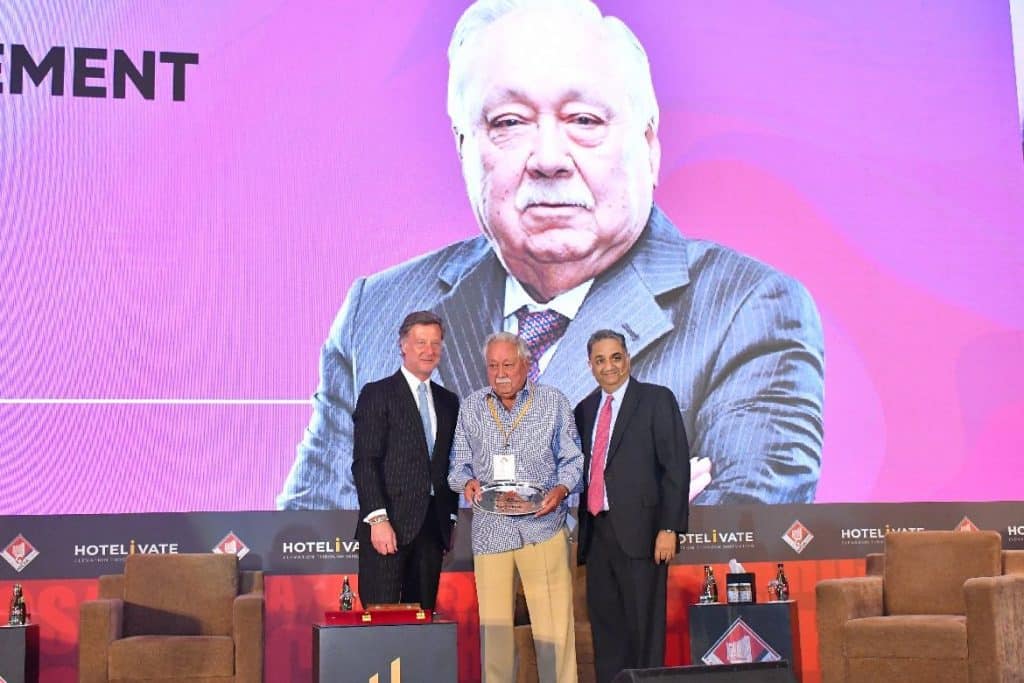
His influence in the industry had been solidified over decades through unwavering determination, courage, and a visionary approach that transformed InterGlobe Enterprises from a single company into a highly successful conglomerate. The presentation of the Lifetime Achievement Award to Kapil Bhatia was met with a standing ovation, serving as a heartfelt tribute to his significant contributions to the industry.
High-energy Leaders Panel -Leading The Operations Charge
Anuraag Bhatnagar, CEO of The Leela Palaces, Hotels and Resorts, initiated an interesting session with a dynamic Leaders Panel. Together, they engaged in a robust discussion on Leading The Operations Charge in the contemporary hospitality landscape.
This session moderated by Anuraag Bhatnagar, CEO of The Leela Palaces, Hotels and Resorts featured prominent figures such as Alan Watts, President of Asia Pacific at Hilton; Dimitris Manikis, President of EMEA at Wyndham Hotels & Resorts; Garth Simmons, COO of Asia Premium, Midscale & Economy at Accor; Rajeev Menon, President of APAC (Excluding Greater China) at Marriott International; and Rajesh Magow, Co-Founder & Group CEO of MakeMyTrip.
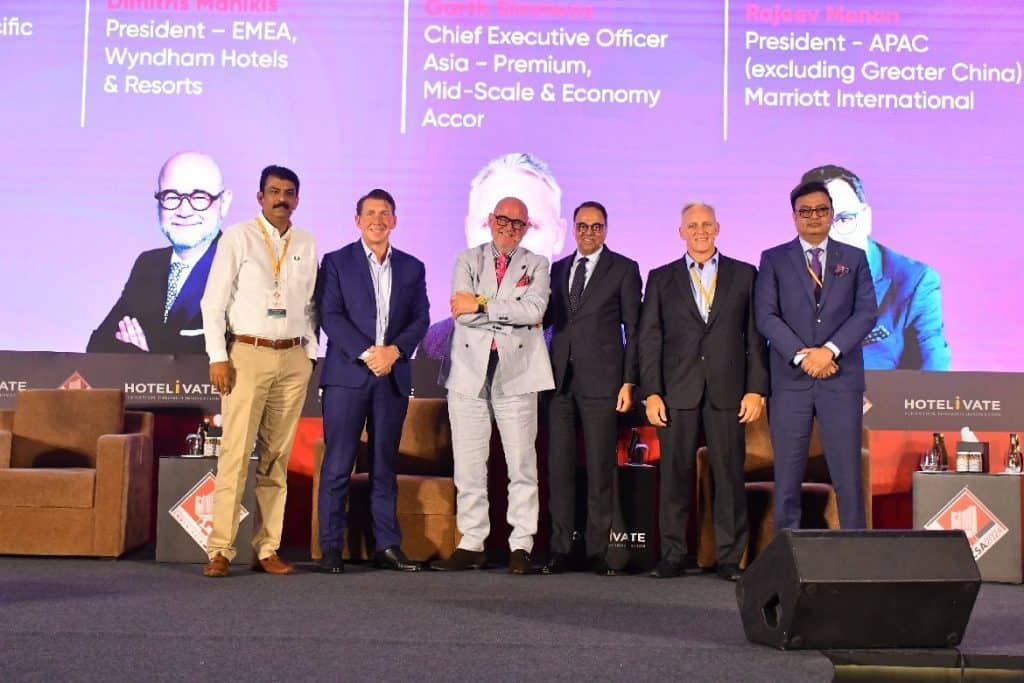
During the session on Leading The Operations Charge at HICSA 2024, panellists delved into the evolving dynamics of the hospitality industry, uncovering two pivotal trends.
Firstly, there remains a noticeable surge in demand for luxury and leisure travel emanating from Tier II and Tier III cities, as observed on MakeMyTrip (MMT). Discretionary spending, which currently accounts for 20% of expenditure, is anticipated to double by 2030. This upswing is attributed to increasing disposable incomes and a shift in consumer travel behaviours, heralding a bright future for leisure travel within the luxury segment.
Secondly, the role of infrastructure development emerged as a significant influencer. The country’s strides in improving infrastructure enhance connectivity and amplify the potential for hospitality developments in previously bypassed regions. This evolution is poised to benefit the hospitality industry, making previously inaccessible areas ripe for exploration and development, and broadening the industry’s horizons into new territories.
Continuing with the key insights from the session, an additional focal point emerged around the integration of technology in the hospitality sector. The consensus among panellists was that the industry is on the cusp of its ‘DigiYatra Moment’ — a reference to the transformative potential of digital technology to streamline the travel experience and customer journey while upholding service quality. This technological evolution stands as the forthcoming major innovation within the sector, with all hotel brands prioritizing its incorporation to enhance operational efficiency and guest satisfaction.
Moreover, the role of General Managers was highlighted as pivotal in setting the tone for innovation and excellence within hotels. It was emphasized that General Managers should lead by example, fostering an entrepreneurial spirit among hotel staff. This approach is crucial for cultivating a workforce that is proactive, innovative, and dedicated to delivering superior customer experiences. By instilling such a culture, hotels can ensure they not only meet but exceed guest expectations, thus strengthening their position in a competitive market.
Interview of Mark Hoplamazian by Ashish Jakhanwala
Ashish Jakhanwala, Chairman, Managing Director, and CEO of SAMHI, conducted a noteworthy interview with Mark Hoplamazian, President and CEO of Hyatt Hotels Corporation. The conversation delved deeply into the essence of “The Heart of Hyatt,” exploring the significant impact it has on fostering enjoyment of life daily and emphasizing the critical importance of coupling empathy with action.
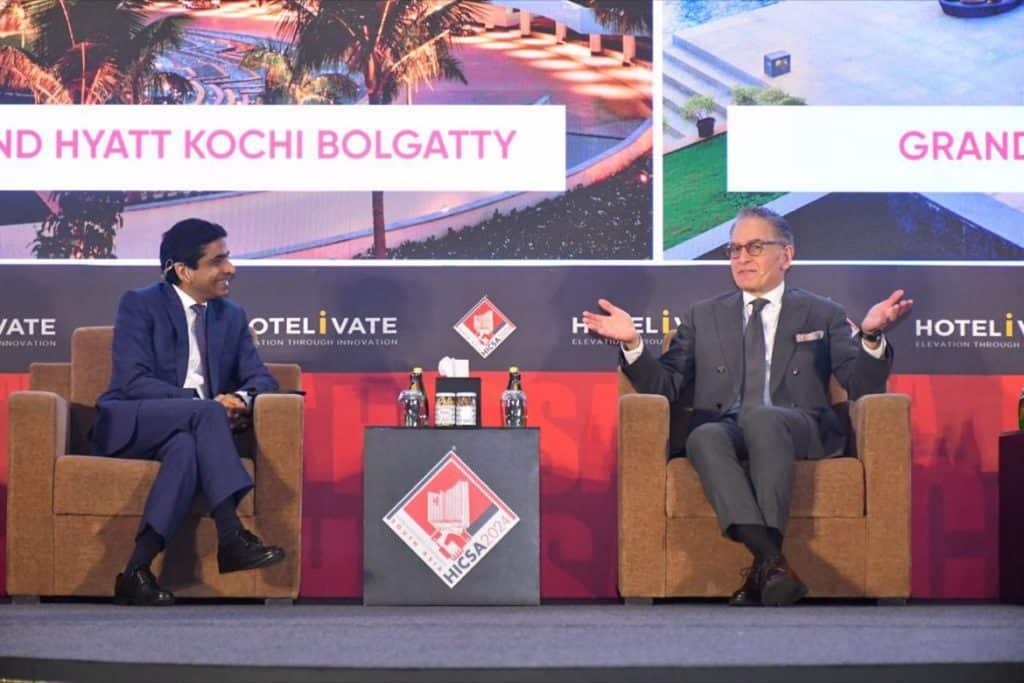
During the interview, several key insights emerged regarding the current trends and future directions of the hospitality industry, particularly in the context of the Indian market. It was revealed that the most pronounced growth in demand within India is now coming from internal leisure travel, a trend that has notably accelerated in the post-pandemic landscape. This shift comes at a time when global supply growth is on a downtrend, thus benefiting the existing market players by reducing competition.
Another point of discussion was the financial dynamics within the hotel industry. There has been a noticeable improvement in operational cash flows among hotels, a development that has subsequently led to increased investor readiness to supply a larger share of equity for hotel investments. This change signals a positive shift in investor confidence and a strong belief in the long-term viability of the hospitality sector.
The strategy behind Hyatt’s introduction of new brands was also discussed, highlighting the company’s focus on meeting the diverse needs of the market. Over recent years, Hyatt has strategically expanded its brand portfolio through acquisitions, introducing multiple new brands designed to cater to various demand segments. This approach demonstrates Hyatt’s commitment to versatility and its keen insight into market demand dynamics.
Central to the conversation was the discussion on Hyatt’s unique company culture, which prioritizes emotional engagement among employees over transactional interactions. This philosophy is integral to fostering a work environment that values cohesion, support, and a deep sense of belonging among the staff.
Furthermore, the interview touched upon Hyatt’s collaboration with Juniper, emphasizing the venture’s potential to unlock significant growth opportunities for hotel ownership companies in India. The partnerships Hyatt has formed in the country are instrumental in enhancing the company’s understanding of the Indian market and improving its capability to navigate its complexities effectively.
The interview between Ashish Jakhanwala and Mark Hoplamazian offered profound insights into Hyatt Hotels Corporation’s strategic priorities, cultural values, and optimistic outlook towards growth and investment in the Indian hospitality landscape. This event provided valuable perspectives on the evolving dynamics of the hospitality industry, particularly in the wake of global challenges and changing market demands.
Beyond The Plate: Restaurant Concepts Creating Magic
Stefan Breg, Managing Partner at Keane Consult & Create, led a captivating session titled “Beyond The Plate: Restaurant Concepts Creating Magic” at the recent Hotel Investment Conference-South Asia (HICSA 2024). The panel boasted an impressive lineup, including Christian Gradnitzer of RIKAS Hospitality Group, Panchali Mahendra of Atelier House Hospitality, Peter Joehnk of JOI-Design Innenarchitekten, Rohit Sachdev of Soho Hospitality, and Zorawar Kalra of Massive Restaurants Pvt. Ltd., who all shared their insights on revolutionizing restaurant concepts.
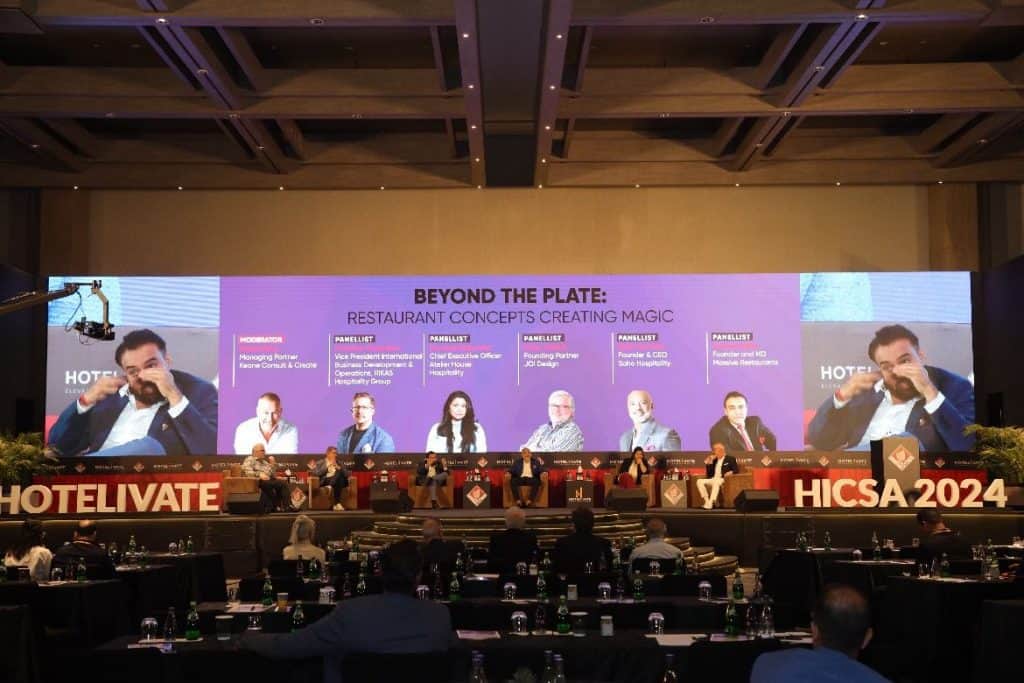
The discussion unveiled that restaurant operating models within hotels are far from uniform. The choice of model varies significantly based on the restaurant’s location, concept, and the degree of involvement needed, particularly in staff hiring and training, underscoring the need for tailored contract terms.
One of the critical revelations was the role of design as a pivotal demand driver in the F&B sector. The panellists agreed that dining is an emotional experience, where design plays a crucial role in forging a connection with diners. This encompasses not just interior design and furnishing but also music and other nuanced details, highlighting the importance of ensuring all third-party consultants and vendors are in sync with the restaurant’s concept and design ethos.
The panel also touched on the imperative for the Indian F&B industry to “Look Inwards”. With the sector on the cusp of substantial growth, the emphasis was on crafting authentically Indian dining experiences that resonate with the cultural richness of the country, rather than emulating international success stories.
Moreover, it was suggested that hotel companies need to recalibrate their perspective on F&B operations, treating them with the same level of importance as room services to boost departmental profitability. A strategic approach to optimizing space usage in hotel restaurants was discussed as essential, transforming underutilized areas into profitable ventures. Establishing a unique brand identity for hotel restaurants was also underscored as a strategy that can significantly enhance a hotel’s overall profitability and create a positive ripple effect across all hotel facilities and outlets.
Expanding the Development Pie via Soft Branding, Management, Franchising, Leasing & Ownership routes
Saurabh Rai, Area Managing Director for South Asia & Middle East at Preferred Hotels, moderated a panel discussion titled “Expanding the Development Pie via Soft Branding, Management, Franchising, Leasing & Ownership routes,” featuring panellists Aniruddh Kumar, Vice President Development India & South Asia, Accor. Davashish Srivastava, Senior Director Development, Radisson Hotel Group – South Asia, Mehul Sharma, CEO and Founder, Signum Hotels & Resorts, Mohnish Chandwaskar, Senior Vice President Business Development, Sterling Holiday Resorts and Smita Thadani, Head Growth & Development, ITC Hotels.
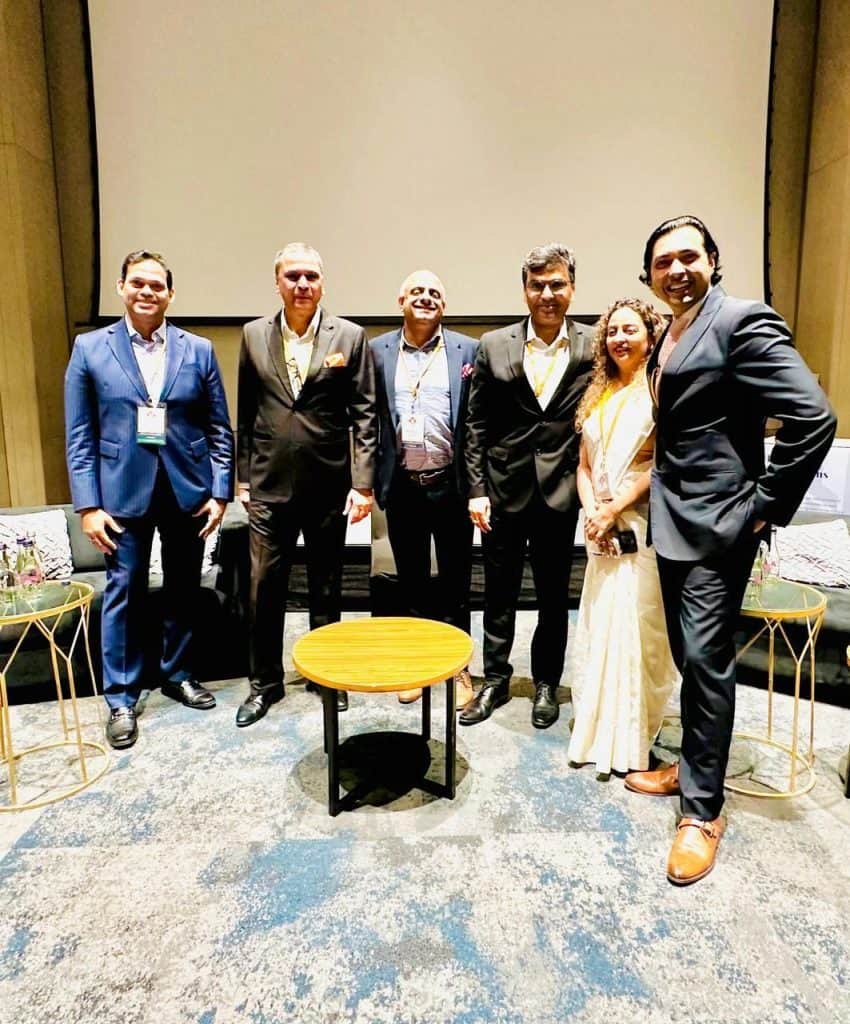
The discussion explored how some of the leading brands are employing a mix of models and strategies to widen the development pie, incorporating innovations in architecture, technology, design, food & beverage, wellness, and entertainment.
The panel discussion offered several key takeaways on the current and future state of the hospitality industry, highlighting optimism and strategic shifts. The financial performance metrics for the industry are robust and are anticipated to remain strong over the next three to five years. This positive outlook is largely fueled by sustained growth driven by robust domestic demand, which is further supported by infrastructure development. This trend is opening new opportunities for hotel brands not only in metropolitan areas but also in tier 2 and tier 3 cities.
The panel noted a gradual increase in the construction pipeline, with aspirations for accelerated growth pending an influx of more capital investment. There’s also a noticeable shift in the mindset of property owners, who are now more inspired than ever to collaborate with brands on innovative ideas. This change is fostering a new level of thoughtful and balanced flexibility in brand-owner relationships.
A significant trend highlighted was the emergence of independent-minded owners who are pushing the boundaries in terms of design, creativity, and freedom of expression, particularly in enhancing the experiential aspects of the guest journey.
Moreover, the branded space in the hospitality industry has become incredibly competitive, with the rate of new brand introductions reaching unprecedented speeds. This has led to crowded categories and subcategories, underscoring the importance of clear differentiation and a strong value proposition for brands to stand out.
Saurabh Rai concluded with: “Being the fifth largest economy in the world, and on the path to becoming the third largest, India has positioned the South Asia region as a global economic powerhouse. With a surge in multi-segment demand across various price points leading to record financial performances in the industry, a majority of both domestic and international hotel brands are eager to expand their market share and develop a more robust pipeline.”
Cutting-edge advancements and innovations in hospitality technology take centre stage
At the recent Hotel Investment Conference-South Asia, a session titled “Cutting-edge advancements and innovations in hospitality technology” took the spotlight, showcasing the latest trends and developments in the field.
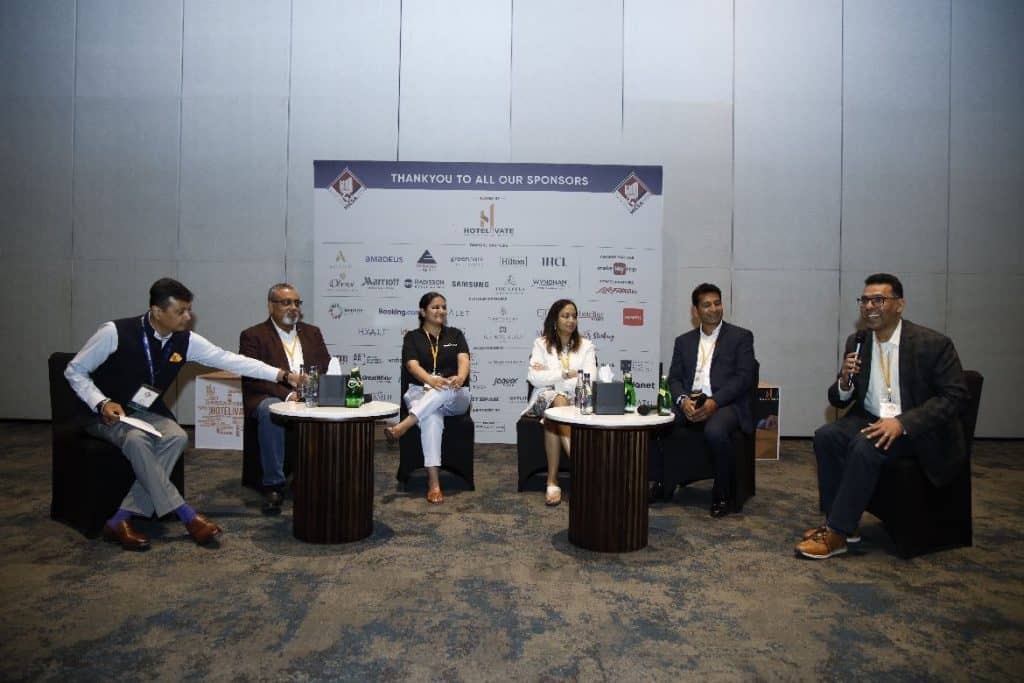
Moderated by Joy Ghosh, Head of Commercial for the Indian Subcontinent, Middle East, Africa, and Turkey at Amadeus, the panel discussion featured prominent figures such as Binu Mathews from IDS Next Business Solutions Pvt Ltd, Gomti Shankar from RateGain, Nitin Goel from Oracle Hospitality, Sameer Umar from HotelIQ by Intelligent Hospitality, and Visha Chauhan from GoFryday.
Talent Troubles: Quality Vs. Quantity
An interesting and pertinent panel centred around “Talent Troubles: Quality Vs. Quantity”. The session delved into a critical aspect of success for the entire hospitality industry. Kunal Vasudeva, Co-Founder & MD of the Indian School of Hospitality, facilitated a highly engaging session at the recent Hotel Investment Conference-South Asia (HICSA 2024), which brought together a distinguished panel including Anjali Dureja, MD – Executive Search at Hotelivate, Diya Suri, Vice President of People at Third Wave Coffee, and Gaurav Pokhariyal, Executive VP – Human Resources at The Indian Hotels Company Limited (IHCL).
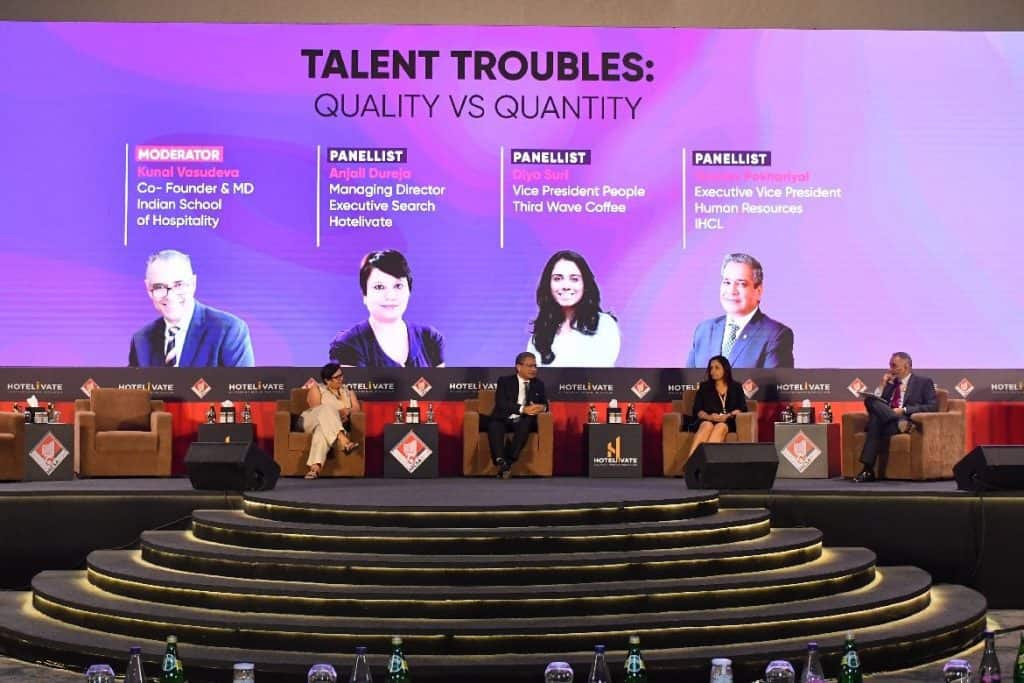
The session highlighted that India’s Travel and Tourism industry is witnessing remarkable growth, presenting a significant challenge in acquiring quality manpower. Addressing this issue, the panellists concurred that attracting and retaining talent necessitates adjustments to meet workforce needs. This includes a focus on enhancing work-life balance, offering differentiated remuneration, and rewards, and providing tailored career planning to cater to individual aspirations.
The need for hotel companies to invest in training and development was emphasized as crucial for fostering talent retention. By implementing structured apprenticeships and development programs, companies can see a notable improvement in retaining their workforce.
Diversity and Inclusion initiatives were identified as essential strategies that need to be integrated at all company levels. These initiatives serve as a powerful tool not only for inspiring change within the company but also in positively influencing the local communities with which they partner.
Moreover, the panelists pointed out the challenge of increasing admissions in hospitality schools in India. They suggested that raising awareness about the diverse opportunities and facets of the hospitality industry at the school level could effectively address this concern, encouraging more students to consider careers in this vibrant sector.
Hot Seat: Leaders on Fire – Moderated by Manav Thadani
To close off the final day on a high note, Manav Thadani MRICS, Founder Chairman, Hotelivate moderated the last session Hot Seat: Leaders on Fire with a stellar panel that included Anil Chadha, Divisional Chief Executive, ITC Limited Hotels Division, Ranju Alex, Area VP – South Asia, Marriott International, Sudeep Jain, MD, South-West Asia, IHG Hotels & Resorts, Sunjae Sharma, MD, India & Southwest Asia, Hyatt Hotels Corporation and Zubin Saxena, Senior VP & Country Head – India, Hilton.
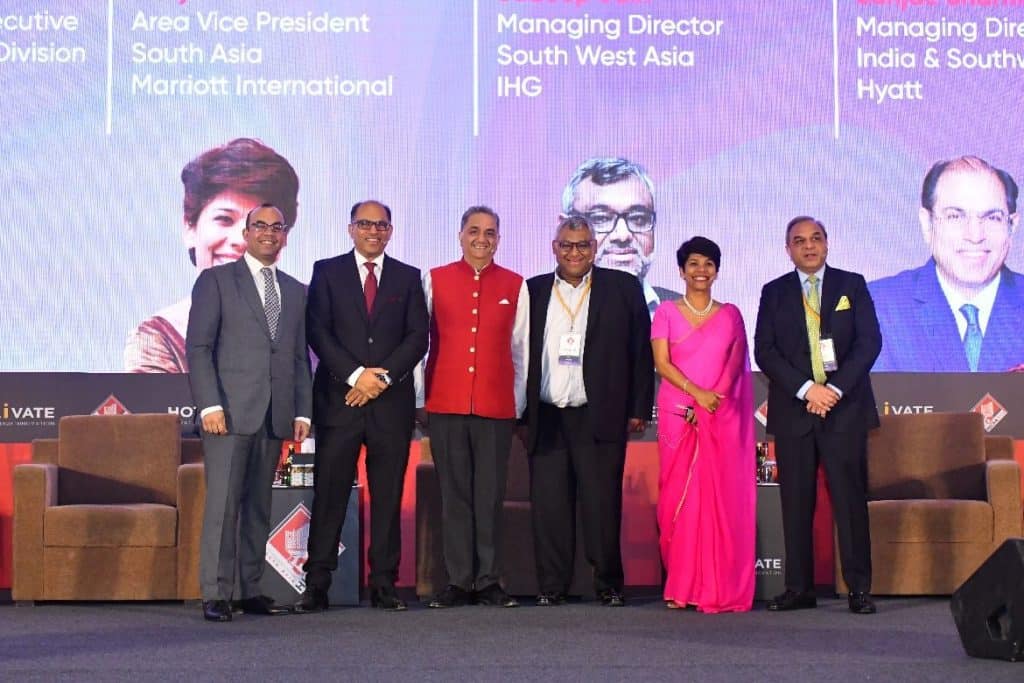
The “Hot Seat: Leaders on Fire” series, moderated by Manav Thadani, unfolded with significant insights into the hospitality industry’s trajectory in India. Industry stalwarts displayed a robust bullishness on the Indian narrative, projecting an exceedingly optimistic forecast for the upcoming decade. It was underscored that, for the first time, the industry’s expansion was being propelled internally, thanks to substantial infrastructural advancements. Despite its current state of underpenetration, the Indian Hospitality sector is anticipated to witness exponential growth over the next ten years.
A pressing necessity was identified in the realm of Food and Beverage (F&B) services. It was noted that the presence of a restaurant now plays a pivotal role in shaping a hotel’s market position and reputation. This revelation underscored the influence of dining services in the hospitality domain.
Further discussions shed light on the importance of maximizing restaurant revenues, a concern extending beyond the confines of Tier 1 cities to touch Tier 2 and Tier 3 markets. Hotels were seen as potential catalysts in spearheading the development of the Restaurant ecosystem within these emerging markets. The concept of marketing restaurants as independent entities, distinct from their parent hotels, was recognized as a strategy that bestows a ‘halo effect’ on the hotel and its wider offerings.
The indispensable role of technology in augmenting the guest experience was acknowledged, alongside a cautionary note on its implementation. The emphasis was on a judicious application of technology to preserve the industry’s hallmark personalization, convenience, and human interaction.
Innovation was heralded as a critical pillar by the leaders, who simultaneously warned against the dangers of complacency. The discussions thus encapsulated a forward-looking perspective on India’s hospitality industry, stressing innovation, technology, and the untapped potential of the F&B sector as key drivers for future growth.
MakeMyTrip General Manager of the Year Awards
The day concluded with the General Manager of the Year Awards, where exceptional GMs were recognized with the General Manager of the Year Award by MakeMyTrip.
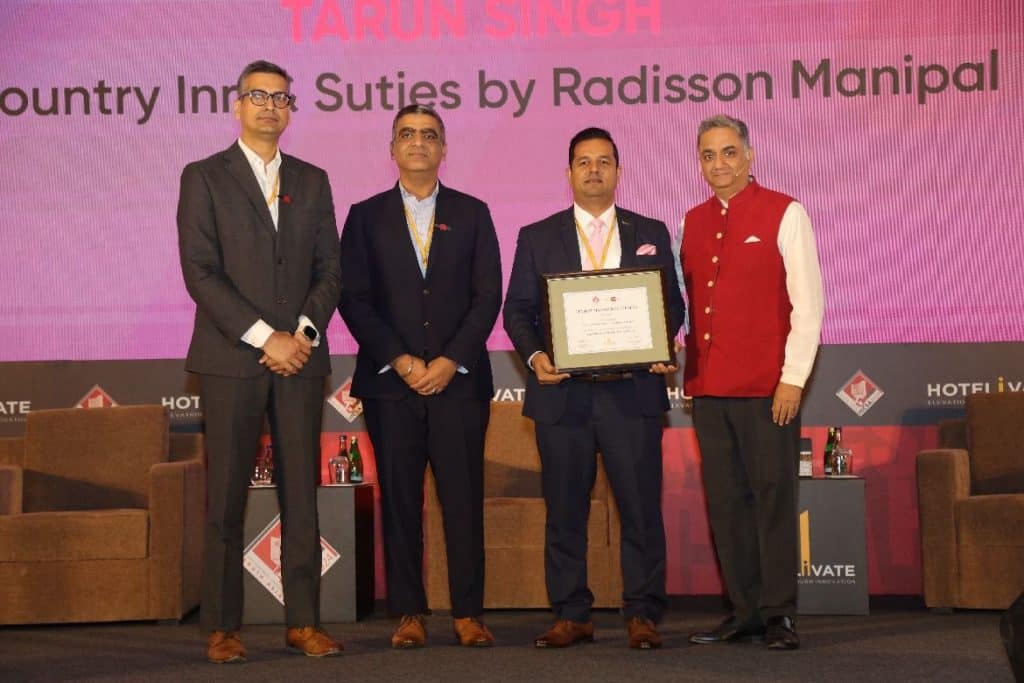
Their exemplary leadership, passion for hospitality, and unwavering dedication set a new standard for excellence in the industry.
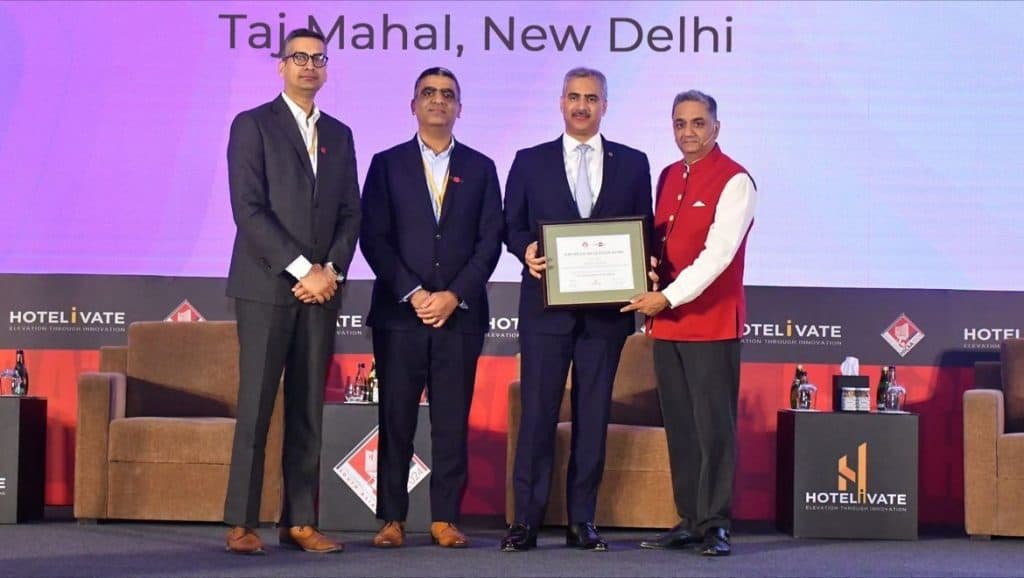
Congratulations were extended to these remarkable leaders for their well-deserved recognition, highlighting their contributions and achievements.
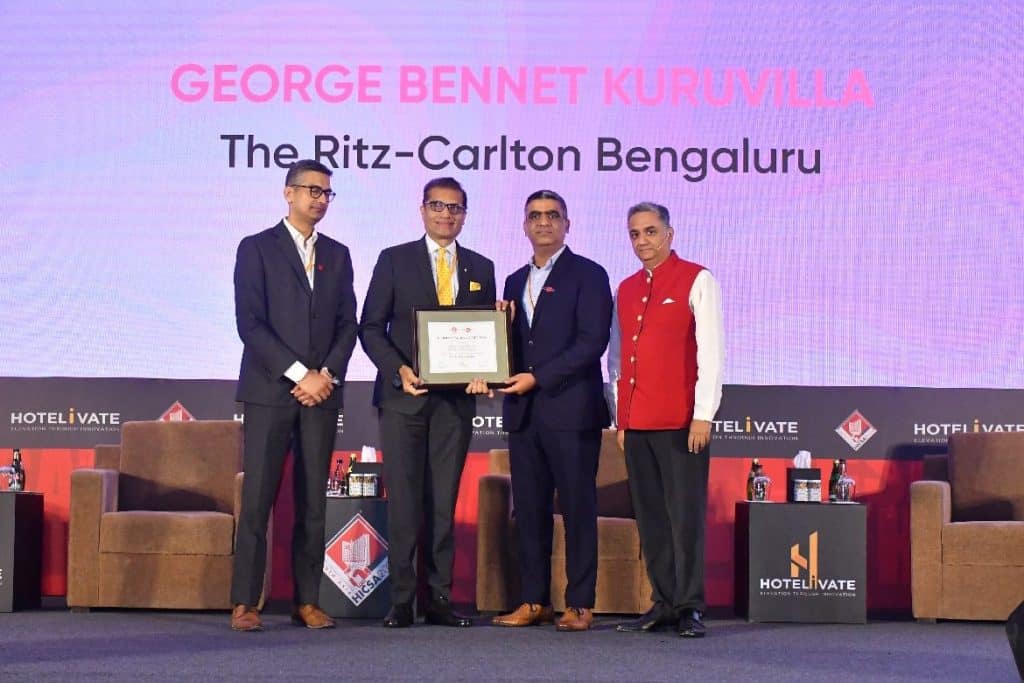
Winners:
- – Tarun Singh, Country Inn & Suites by Radisson, Manipal – Budget and Economy Hotels Segment
- – Arjun Kagallu, Novotel Kolkata Hotel And Residences – Mid-Market and Upper Mid-Market Hotels Segment
- – Sanjay Pandita, Aurika Coorg – Luxury by Lemon Tree Hotels – Upscale and Upper Upscale Hotels Segment
- – Rajneesh Kumar, Courtyard by Marriott Aravali Resort – Upscale and Upper Upscale Hotels Segment
- – George Bennet Kuruvilla, The Ritz Carlton Bengaluru – Luxury Hotels Segment
- – Satyajeet Krishnan, Taj Mahal, New Delhi – Cluster General Manager Role
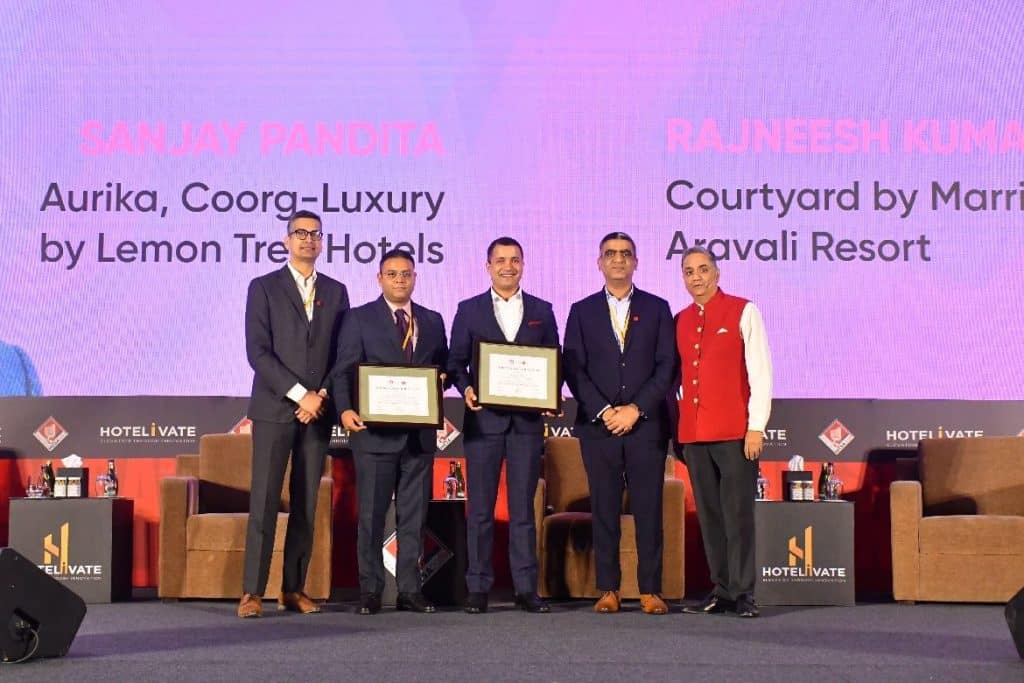
As the curtains fell on HICSA 2024, attendees expressed appreciation for the great networking opportunities, dynamic nature of discussions, and insightful contributions to innovating and shaping the future of the hospitality sector.
Read more: News



